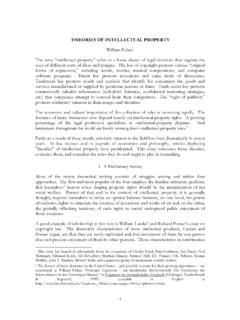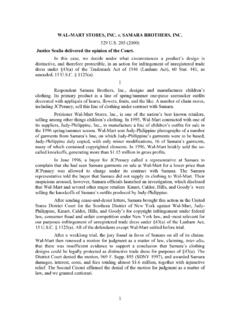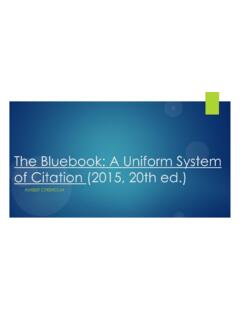Transcription of PRE-TRIAL PROCEDURE - Berkman Klein Center
1 Course Title: Evidence Professor: Charles Nesson Date: Winter 2007. PRE-TRIAL PROCEDURE . I. INITIAL PLEADINGS. A. Complaint The complaint is the first step to getting to trial in a civil proceeding. This document, once filed in the appropriate court system, formally establishes a cause of action against another party, and details the basis for the cause of action. The form of the complaint generally is controlled by federal, state and local rules of civil PROCEDURE . For example, Fed. R. Civ. P. 8(a) and 8(e) provide: A complaint shall contain (1) a short and plain statement of the grounds upon which the court's jurisdiction depends, (2) a short and plain statement of the claim showing that the pleader is entitled to relief, and (3) a demand for judgment for the relief the pleader seeks.. Each averment of a pleading shall be simple, concise, and direct. No technical forms of pleading or motions are required. A party may set forth two or more statements of a claim or defense alternately or hypothetically, either in one count or defense or in separate counts or defenses.
2 A party may also state as many separate claims or defenses as the party has regardless of consistency and whether based on legal, equitable, or maritime grounds. Most courts follow the above guideline that the complaint should be short, plain, simple, concise and direct, with the exceptions of causes of actions that require more detailed allegations, such as fraud. Fed. R. Civ. P. 9(b). Additionally, virtually all courts require a specific demand for jury trial, otherwise this right is waived. Fed. R. Civ. P. 38. As a general rule, even when not required by court PROCEDURE , it's best to keep complaints as short, plain, simple, concise and direct as possible, so as not to limit future arguments or positions that might be inconsistent with the complaint. While most jurisdictions permit the pleading of inconsistent positions within a complaint, I try to avoid this because some jurisdictions permit the complaint to be introduced as evidence. Inconsistent positions can hinder the plaintiff's credibility and position.
3 Harvard Law School, Evidence Martin Levin PRE-TRIAL PROCEDURE , Page 1. Course Title: Evidence Professor: Charles Nesson Date: Winter 2007. On the other hand, you definitely want to make sure that you preserve all causes of actions and positions you might wish to argue at trial. For this reason, I generally prepare the initial complaint utilizing very general phrases and terms, minimum factual statements, and include as many potential causes of actions as I can assert. As discovery proceeds, and the evidence becomes more clear, I periodically review my complaint to determine whether any additional causes of actions can be asserted and/or whether I need to include additional factual information in my complaint to support the causes of actions previously pled. I then immediately amend the complaint, if necessary, to support every cause of action and issue I intend to argue at trial. It's not uncommon for me to amend my complaints three or four times during the discovery process. I do this to make sure that I have sued the properly named defendants, and that I can overcome motions for judgment on the pleadings and motions for summary judgment.
4 I also do this to make sure that the evidence I intend on introducing at trial is not excluded on the grounds of being irrelevant to the causes of actions pled in the complaint. I rather have multiple amendments to my complaint than to wait too long and be prevented from amending the complaint due to it being untimely. See for example Fed. R. Civ. P. 15. Importantly, while the rules of civil PROCEDURE dictate the form of the complaint, much of the substance of the complaint will be controlled by statutory, administrative and common law. It's crucial before filing the initial complaint to thoroughly research the United States Code, the Code of Federal Regulations, federal common law, state statutes, state administrative codes, state common law, local codes and ordinances, and applicable jury instructions. These sources will provide you crucial information regarding the various causes of actions available, and the elements of each cause of action. B. Answer: The answer to a complaint is the defendant's official admission/denial of the facts and issues asserted in the plaintiff's complaint, including any affirmative defenses that the defendant asserts (such as, accord and satisfaction, assumptions of the risk, estoppel, fraud, laches, res judicata).
5 Similar to the form of a complaint, defense counsel should write the answer in short, plain and concise terms. Fed. R. Civ. P. 8(b) & (e). Most often, the defendant has the luxury of simply writing the words denied or unknown. Rarely does the defense, nor should the defense, admit many allegations in the complaint. Plaintiff's counsel, however, should immediately and carefully compare the complaint to the answer to make sure that the defendant admitted the allegations that plaintiff's counsel thought should be admitted; such as, the defendant's full legal name, the wrongdoer was an employee of defendant, the wrongdoer was acting within the scope of his employment, etc. It's important for the defendant to timely answer the complaint, as the defendant's failure to deny an assertion in the complaint is an admission to its truth. Fed. R. Civ. P. 8(e) Also, the Harvard Law School, Evidence Martin Levin PRE-TRIAL PROCEDURE , Page 2. Course Title: Evidence Professor: Charles Nesson Date: Winter 2007.
6 Defendant needs to be careful to include all possible affirmative defenses in its answer, and to timely file motions that must be asserted before or simultaneously with the answer; , lack of personal jurisdiction, lack of subject matter jurisdiction, improper venue, failure to state a cause of action. Fed. R. Civ. P. 12(b). Defense counsel should periodically review the answer to make sure that all possible affirmative defenses, and potential counterclaims, have been asserted. If necessary, the defendant should file a motion to amend the answer. A judge will prevent the presentation of affirmative defenses that have not been timely raised before trial. C. Reply: A reply is the plaintiff's formal response to the defendant's answer. Many courts, such as federal court, do not permit the filing of a reply other than to respond to an asserted counterclaim. Fed. R. Civ. P. 7(a). Some courts, however, do require a formal reply to affirmative defenses. You want to carefully review the procedures of each court you appear to determine the requirements for filing a reply.
7 If a reply is required, you generally will follow the same PROCEDURE the defense follows in responding to a complaint. II. CASE MANAGEMENT CONFERENCE. Most courts, especially in federal court, issue a case management order soon after the complaint and answer are filed. The case management order generally specifies the discovery procedures and limitations, and provides anticipated schedules for the completion of discovery, exchange of witness and exhibit lists, PRE-TRIAL conferences, and trial settings. While the exact dates for the PRE-TRIAL conference and trial setting most often will not be listed, time periods will be provided. Often, the federal, state and local rules of PROCEDURE provide guidance to the attorneys regarding case management orders to be issued. For example, Local Rule , Massachusetts Federal Rules of Civil PROCEDURE , provides: In every civil action the judge .. shall convene a scheduling conference as soon as practicable, but in any event within ninety (90) days after the appearance of a defendant and within one hundred twenty (120) days after the complaint has been served on a defendant.
8 Unless otherwise ordered by the judge, counsel for the parties must, pursuant to Fed. R. Civ. P. 26(f), confer at least 21 days before the date for the scheduling conference for the purpose of: Harvard Law School, Evidence Martin Levin PRE-TRIAL PROCEDURE , Page 3. Course Title: Evidence Professor: Charles Nesson Date: Winter 2007. (1) preparing an agenda of matters to be discussed at the scheduling conference, (2) preparing a proposed pretrial schedule for the case that includes a plan for discovery, and (3) considering whether they will consent to trial by magistrate judge. Unless otherwise ordered by the judge, the parties are required to file a joint statement containing a proposed pretrial schedule, which shall include: (1) a joint discovery plan scheduling the time and length for all discovery events . If the court does not issue a case management order, you always have the right to seek a hearing to discuss these same issues with the court and get guidance early in the case.
9 This can be helpful when you are concerned with the discovery process taking too long or a trial date being delayed. You can ask the court to issue a time schedule for the completion of discovery, exchange of witness and exhibit lists, and the setting of a pretrial conference. III. DISCOVERY. A. Generally: Discovery is the legal term referencing the formal investigation process in litigation. The main forms of discovery include depositions, interrogatories, requests to produce, requests to admit, non-party production subpoenas, independent medical examinations, site visits and product testing. The process of discovery generally is controlled by federal, state and local rules of procedures. For example, Fed. R. Civ. P. 26 provides that the attorneys must meet as soon as practicable in order to propose a discovery plan, and to exchange potential witness, exhibit and evidence lists. Of course, the court can, and usually does, issue directives as to the specific time periods in which this meeting must take place, and in which the exchange of information must occur, including the detailed reports of expert witnesses.
10 In addition to this required process, Fed. R. Civ. P. 26 permits depositions, interrogatories, requests to produce, independent medical examinations, and requests to admit. Generally, however, these forms of discovery are not permitted until after the initial attorneys' meeting and exchange of required information. All forms of discovery are subject to objections on grounds of privilege, such as attorney-client and work product. Harvard Law School, Evidence Martin Levin PRE-TRIAL PROCEDURE , Page 4. Course Title: Evidence Professor: Charles Nesson Date: Winter 2007. B. Interrogatories: The submission of interrogatories for discovery purposes is the process of serving formal written questions to opposing counsel, which opposing counsel is required to answer in a specified time period. Interrogatories may relate to any matter relevant to the claims and defenses asserted, including the existence, description, nature, custody, condition, and location of any books, documents or other tangible things, and the identity and location of persons having knowledge of any discoverable matter.







